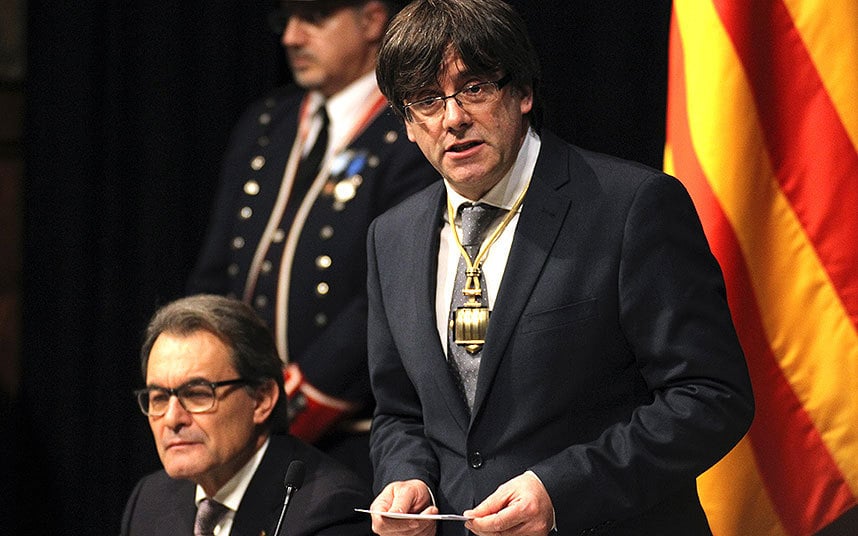
By Blanca Rodríguez and Sonya Dowsett
MADRID/BARCELONA - The Spanish cabinet was meeting on Wednesday to decide its response to Catalan moves to declare independence, but the prospect of dialogue to ease Spain’s worst political crisis in four decades already seemed remote.
The fraught situation became even more confused on Tuesday night when Catalan leader Carles Puigdemont made a symbolic declaration of independence from Spain but then immediately suspended it to allow for talks with the Madrid government.
Such a declaration had been widely expected after the Catalan government said 90 percent of Catalans voted for a breakaway in an Oct. 1 referendum that Spain had declared illegal and which most opponents of independence boycotted.
But Spain responded angrily to Puigdemont’s speech, saying the Catalan government could not act on the results of the referendum.
“Neither Mr. Puigdemont nor anyone else can claim, without returning to legality and democracy, to impose mediation... Dialogue between democrats takes place within the law,” Deputy Prime Minister Soraya Saenz de Santamaria said on Tuesday.
Prime Minister Mariano Rajoy spoke to other political parties on Tuesday to seek the greatest possible support for the government’s response.
Puigdemont’s speech also disappointed supporters of independence, thousands of whom watched proceedings on giant screens outside parliament before sadly leaving for home.
Financial markets, however, were encouraged that an immediate declaration of independence had been avoided.
Although Puigdemont’s climbdown appeared to lessen the immediate risk of a head-on confrontation between the Catalan and Madrid governments, Spanish media said it was still possible Rajoy could take strong measures, including possibly suspending Catalonia’s autonomy and forcing new regional elections.
The Catalan government said if Madrid invoked this option, using Article 155 of the Spanish constitution, it would press ahead with independence.
“If the government implements 155, it means there is no willingness for dialogue...and so obviously we would have to be consistent with our commitment to the people of Catalonia,” Catalan government spokesman Jordi Turull told Catalunya Radio.
“We have given up absolutely nothing ...We have taken a time out...which doesn’t mean a step backwards, or a renunciation or anything like that,” he said.
MARKET RELIEF
Following Puigdemont’s speech, Spain’s benchmark IBEX share index rose as much as 1.6 percent, outperforming the pan-European STOXX 600 index. The rally pushed the main world stocks index, the MSCI’s 47-country ‘All-World’ index, to a record high.
Spain’s 10-year government bond yield -- which moves inversely to the price -- dropped 5 basis points to 1.65 percent in early trade, according to Tradeweb data.
But some analysts said Puigdemont’s stance would prolong the uncertainty and risk from the Catalan impasse.
It could also rock his Catalan government, with one far-left party inside his coalition, the pro-independence CUP (the Popular Unity Candidacy), saying he may have missed an historic opportunity. It gave him one month to find a negotiated solution the CUP doubts will ever come.
“You say we are suspending the effects because we are going to negotiation and mediation. Negotiation and mediation with whom? With a Spanish state that continues to harass and persecute us?” CUP leader Anna Gabriel said.
Thousands of independence supporters, flying Catalan separatist flags, had gathered in a party atmosphere to watch Puigdemont’s speech on big screens near the 18th-century parliament building, eagerly expecting a declaration of independence.
But their hopes were dashed, leaving some in the crowd in tears, whistling or shaking their heads.
“I am disappointed. I hoped for a declaration of independence and it didn’t happen,” said 18-year-old student Julia Lluch, among a crowd of independence supporters who were rolling up their flags and drifting away from the assembly.
In Brussels, there was relief that the euro zone’s fourth-largest economy now had at least bought some time to deal with a crisis that was still far from over.
One EU official said Puigdemont “seems to have listened to advice not to do something irreversible”.
Both Rajoy’s government and European Council President Donald Tusk had urged Puigdemont not to proclaim independence.
The Catalan crisis has deeply divided the northeastern region itself as well as the Spanish nation. Opinion polls conducted before the vote suggested a minority of about 40 percent of residents in Catalonia backed independence.
The stakes are high -- losing Catalonia, which has its own language and culture, would deprive Spain of a fifth of its economic output and more than a quarter of exports.
Some of Catalonia’s largest companies have moved their head offices out of the region and others were set to follow if he had declared independence.


